Xu Kecheng:
There is a patient that I have never been able to let go of. He is Lao Wang, a leader of a county-level city under my hometown Nantong. In 2010, Lao Wang suffered from lung cancer in the left upper lung with iliac metastasis. Pathology showed undifferentiated adenocarcinoma with EGFR mutation. He received targeted therapy, chemotherapy and radiotherapy. In May 2016, the tumor in the left upper lung grew to 8 cm. He received cryoablation in our hospital. Two weeks later, a cavity formed in the tumor, and one month later, there was a sudden heavy bleeding. He was given emergency surgery and the left upper lobe was removed. The bleeding stopped, but most of the tumor still remained, and there were a lot of cancer cells at the edge of the surgical resection. I remember it was a day in October 2016. Lao Wang called and said he wanted to have a "private talk" with me and "don't bring anyone else." I went to the ward. He asked: "Can I live for a year?" I said "It's difficult." He asked: "Is there any special treatment?" I said "There is almost no conventional treatment." "Whether it is conventional or not, Professor Xu, we are from the same hometown, I want to survive." Lao Wang cried and begged. I comforted him and asked him to go home and "try combined immunotherapy". Two months later, on January 2, 2017, just after I got to work, Lao Wang came to my office, shaking a stack of examination reports in his hand, and said: "Is this true? Really? Am I dreaming?" It turned out that Lao Wang went to Shanghai Chest Hospital for a follow-up examination a few days ago, and the CT showed "no evidence of cancer", and the tumor markers that were originally elevated in the blood all dropped to normal.
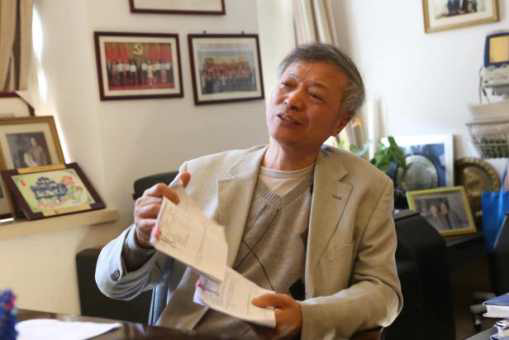

Lao Wang excitedly showed his examination results to Xu Kecheng and the visiting experts. The right picture shows patients who received combined immunotherapy: Lao Wang (2nd from left), Mr. Cao (1st from left, adrenocortical carcinoma patient, described later), Chief Nurse Huang (1st from right, small cell lung cancer patient, described later), Professor Yin Zhinan (2nd from right, Jinan University)
Member:
Only received combined immunotherapy?
Xu Kecheng:
Yes. The "scars" on his arms were the injection marks, which exchanged for 2 years of "cancer-free survival". He was a leader, so he naturally gave him more suggestions. In order to "increase the efficacy", he later received the "magic drug" PD-1 inhibitor treatment in his hometown. A week later, he suddenly developed interstitial pneumonia and "died". It's a pity and sad!
Li Dinggang:
Some people "got into trouble" not because of the treatment itself, but because of their own or "well-meaning people's" "fixed thinking". Recently, the media reported that some celebrities left, and it seems that they may have a different ending. This is what I said before, Academician Wang once said that cancer treatment must "change thinking".
Xu Kecheng:
Professor Li is right. Look at this leader. One day in February 2009, a tall man came to my office and said "Save my wife" as soon as he sat down. It turned out that he was from Shenzhen and was a leader of the university. His wife, Teacher Lin, who is also a teacher at the university, suffered from lung cancer with brain and bone metastasis and had a splitting headache every day. On the MRI, brain metastasis spread all over the brain, like stars in the sky. I suggested "whole brain irradiation". He said his wife would not accept it, and he did not agree. He left disappointed.
On the third day, the leader came again. I still suggested "radiation therapy". A week later, he came to my office for the third time and cried. My compassion suddenly emerged. I asked my student Dr. Lei, who was working in Shenzhen at the time, to visit Teacher Lin every week to inject compound immune agents. Two months later, Teacher Lin's lung cancer was under control, and one month later, the patient's headache completely disappeared. Two months later, MRI examination showed that most of the metastasis in the brain and ribs had disappeared. Until 2014, Teacher Lin had been receiving compound immune agents and had not received any other treatment. At that time, my family was in Shenzhen, and our two families became good friends and often visited each other.
Member:
It's hard to imagine. What happened later?
Xu Kecheng:
Five years later, I suddenly saw on the Internet that her husband "had an accident", and I was shocked: What about his wife? Sure enough, one year later, her husband came to my Guangzhou office as soon as he “came out” and almost cried, saying, “Nothing else matters. But my wife…” His wife’s disease suddenly relapsed.
Li Dinggang:
Psychological blow is often an important factor in the progression of cancer. This case is too typical.
Xu Kecheng:
Professor Li is right. Another Malaysian patient of mine had a different ending.
On August 14, 2016, 39-year-old Ms. Lin, a famous singer, was admitted to our hospital due to lung adenocarcinoma. Later, Ros1 ectopic mutation was confirmed. After targeted drug treatment, her lung lesions improved rapidly, but brain metastasis appeared soon. She received radiotherapy and partially improved. Later, she received combined immunotherapy. So far, she has no progression and leads the choir to tour charity performances everywhere. She told me: She is happy every day and forgets herself. I once watched her performance. She sang almost all the time in 2 hours. It was hard to imagine that she was a patient with metastatic lung cancer, especially brain metastasis.
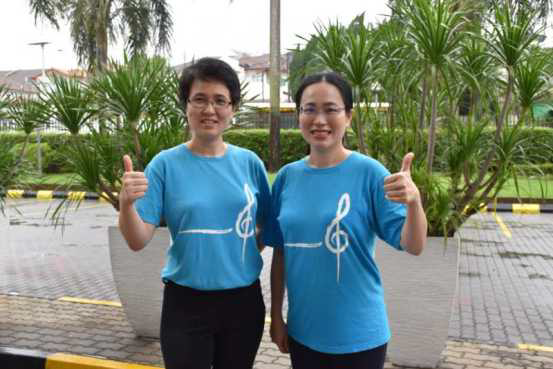
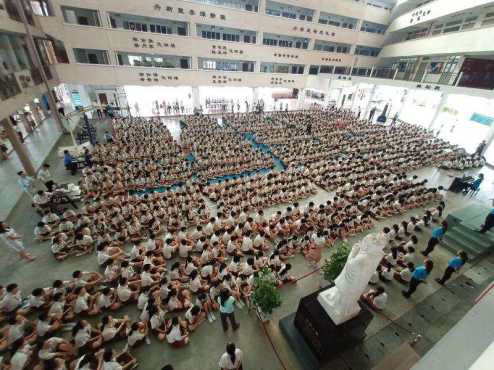
In 2019, Ms. Lin (right 1) visited Xu Kecheng in Guangzhou. The picture on the right shows the epidemic in 2020. Ms. Lin (left) led the choir to tour in Malaysia: "Go Wuhan, Go China"
Li Dinggang:
Lung cancer brain metastasis, especially like "starry sky" metastasis, due to the existence of the blood-brain barrier, drugs cannot enter, except for radiotherapy, there is almost no way to treat it. Moreover, radiation encephalopathy caused by radiotherapy is sometimes more painful for patients. Complex immunity can control such brain metastasis for a long time, which is amazing. But the "magical" spiritual power cannot be ignored.
Member:
My sister has small cell lung cancer and has undergone 8 chemotherapy. Now there are multiple metastases in the body. What is the next treatment?
Xu Kecheng:
Once small cell lung cancer recurs, it is extremely difficult to treat. On the morning of November 11, 2016, I suddenly received a call from the ward saying that a patient who had just been admitted yesterday was about to be discharged. I immediately rushed to the ward. The patient was Ms. Huang, the head nurse of a large hospital in Wenzhou. She was curled up on the bed with a painful look on her face. When she saw me, she burst into tears, held my hand, and said intermittently: "Director, it hurts so much. I have been a nurse for decades and know my disease... ... Don't persuade me... ... There is no cure..."
She was diagnosed with small cell lung cancer in the left lung a year ago and received chemotherapy. Eight months later, a new tumor appeared in the left chest cavity, accompanied by thoracic vertebrae metastasis. Her family sent her to Hong Kong for treatment for a few days, but the pain in her waist and back worsened day by day, and even morphine could not stop it. I held her hand tightly, looked at her, and said: "You are so beautiful, you will not leave. Give me a few days! Let me try." As a colleague in the medical field, I couldn't help but shed tears. I injected 1.5 ml of the compound immune agent subcutaneously in her arm.
The next day, she called me on her own initiative and said that the pain was relieved and she could walk. A week later, she came to my office and took a photo with several patients from Jiangsu who also received combined immunotherapy. After that, she received radiotherapy and cryotherapy. At the end of December 2016, a CT scan was performed again, and it was found that the original pleural effusion had disappeared. The patient's pain completely disappeared, and she could enjoy life normally. The previously elevated tumor markers dropped to the normal range.
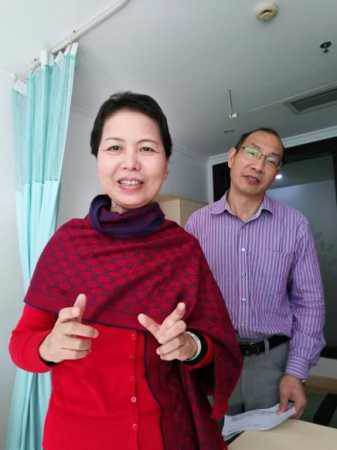
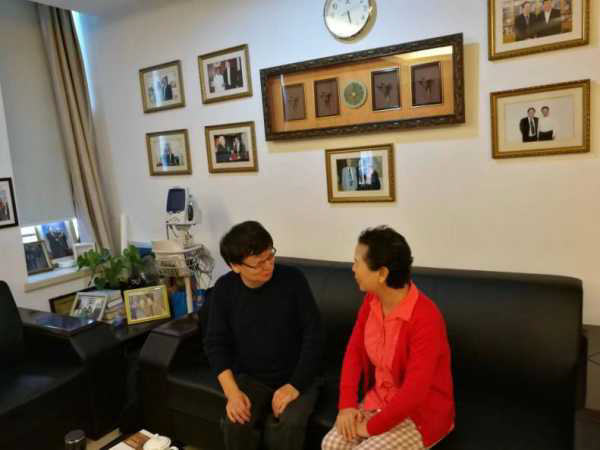
Chief Nurse Huang excitedly talked about her "resurrection". Her husband is shown behind. The right picture shows Professor Lv Youyong of Peking University Cancer Hospital talking to Chief Nurse Huang about her miraculous experience
(To be continued)






